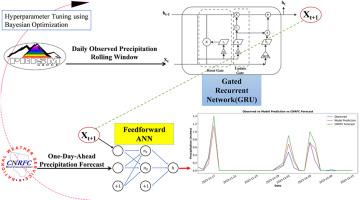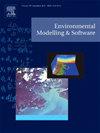用于改善短期降水预报的混合深度学习框架
IF 4.6
2区 环境科学与生态学
Q1 COMPUTER SCIENCE, INTERDISCIPLINARY APPLICATIONS
引用次数: 0
摘要
降水预报对水资源、洪水风险和农业规划至关重要,但系统的复杂性和不确定性限制了预测的准确性。本研究引入了一种用于日降水预报的混合深度学习(DL)模型,使用门控循环单元捕获时间依赖性和多层感知器来解释非线性效应。在数据预处理、架构设计和模型训练期间,使用贝叶斯优化算法进行超参数调优。利用McCloud水库流域的日降水数据对该框架进行了评估。与原始预测基线相比,均方误差降低68%;Nash-Sutcliffe和Kling-Gupta效率指数也有所改善。对大多数降雨强度的预测技能都有所提高,威胁得分和偏差指标也有明显提高,即使是对极端事件也是如此。结果表明,所提出的混合DL可以改善降雨预测,支持水库运营、洪水准备和气候适应型水资源管理。本文章由计算机程序翻译,如有差异,请以英文原文为准。

A hybrid deep learning framework for improving short-term precipitation forecasts
Precipitation forecasting is essential for water-resources, flood-risk, and agricultural planning, yet the complexity and uncertainty of the system limit predictive accuracy. This study introduces a hybrid deep learning (DL) model for daily precipitation forecasting, using a gated recurrent unit to capture temporal dependencies and a multilayer perceptron to account for nonlinear effects. Hyperparameter tuning was performed using a Bayesian optimization algorithm during data preprocessing, architecture design, and model training. The framework was evaluated using daily precipitation data from the McCloud Reservoir drainage basin. 68% decrease in mean squared error was obtained compared with the raw forecast baseline; improvements were also observed in Nash–Sutcliffe and Kling–Gupta efficiency indices. Predictive skill was increased for most rainfall intensities, and threat-score and bias metrics show clear gains, even for extreme events. Results show that the proposed hybrid DL can improve rainfall prediction and support reservoir operations, flood preparedness, and climate-resilient water management.
求助全文
通过发布文献求助,成功后即可免费获取论文全文。
去求助
来源期刊

Environmental Modelling & Software
工程技术-工程:环境
CiteScore
9.30
自引率
8.20%
发文量
241
审稿时长
60 days
期刊介绍:
Environmental Modelling & Software publishes contributions, in the form of research articles, reviews and short communications, on recent advances in environmental modelling and/or software. The aim is to improve our capacity to represent, understand, predict or manage the behaviour of environmental systems at all practical scales, and to communicate those improvements to a wide scientific and professional audience.
 求助内容:
求助内容: 应助结果提醒方式:
应助结果提醒方式:


